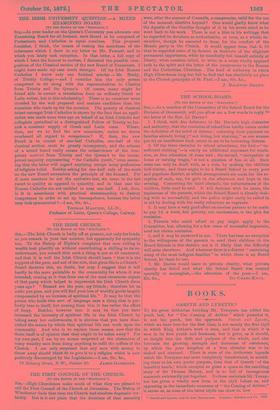THE IRISH UNIVERSITY QUESTION.—A MIXED EXAMINING BOARD.
(To THE EDITOR OF THE "SPECTATOR.")
Sra,—In your leader on the Queen's University you advocate one Examining Board for all Ireland, such Board to be composed of Protestants and Catholics in equal numbers. This proposal furnishes, I think, the means of testing the soundness of the inferences which I drew in my letter to Mr. Fawcett, and to which you lately took exception. In that letter, a fall copy of -which I have the honour to enclose, I discussed the possible com- position of the Classical section of the new Board of Examiners. I might have made my case much stronger. Of lay Irish Roman Catholics I know only one finished scholar — Mr. Brady, of Trinity College —and I consider him the only person -competent to sit along with the representatives in Classics from Trinity and the Queen's. Of course, many might be found able to correct a translation from an ordinary Greek or Latin writer, but is this scholarship? There is no examiner more dreaded by the well prepared and mature candidate than the examiner who reads up for the occasion. The paucity of classical talent amongst Irish Catholics is shown by the fact that an appli- cation was made some time ago on behalf of an Irish Catholic and collegiate periodical to a distinguished Fellow of Trinity to fur- nish a constant supply of Greek and Latin verse. Where, then, are we to find the new examiners, unless we throw -overboard all regard to competence ? If, then, the new Board is to consist of one-half Catholics, one-half of the -classical section must be grossly incompetent, and the scheme of a mixed board really means the subservience of the com- petent materiel from Trinity and the Queen's to the incom- petent majority representing "the Catholic youth," even assum- ing that the latter will regard anything except noisy professions of religions belief. Besides asking for one-half only of the seats on the new Board surrenders the principle of the demand. For if mere numbers be not the exclusive -beet, we come in the last resort to quality as opposed to quantity, and in that case the Roman Catholics are not entitled to near one-half. I ask, then, is it in accordance with practical statesmanship to destroy -competence in order to set up incompetence, because the latter may look symmetrical ?—I am, Sir, &c.,
THOMAS MAGIIIRE, LLD., Professor of Latin, Queen's College, Galway.


































 Previous page
Previous page